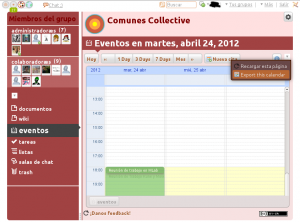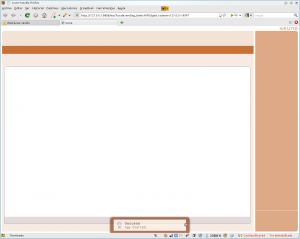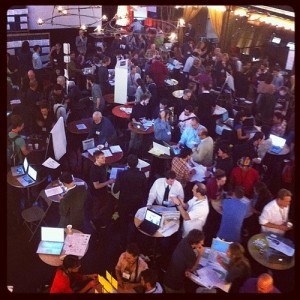We have received several times questions asking us to compare Kune with another federated social network: N-1/Lorea/Elgg. This comparison would also be valid with several other PHP-based social networks.
Both projects felt very identified with each others’ aims and with the 15M movement in Spain. N-1 (a node of Lorea, which is an adaptation of Elgg) became rather popular and increased its use in the wake of these protests, where multiple assemblies used it to coordinated themselves. By then, Kune was not yet ready for massive use (although it coined a release of this period “15M”).
Technically and functionally these two platforms differ in several aspects:
- Lorea is PHP-based static multi-page, while Kune is a GWT-developed, AJAX-powered, single-page “rich internet application“.
- Lorea, as many other social networks, focus on communication/sharing, while Kune focuses on collaboration/creation of contents. The approach is different, and thus the functionalities and priorities.
- In Lorea you can write real-time docs using pads which are just plain text. On the other hand, all contents within Kune are waves that allow multiple users to collaborate simultaneously writing a hypertext document with rich media (videos, images, maps, polls, blackboards, etc), gadgets and bots.
- Lorea can be extended through modules (modifying the codebase) while Kune can be extended through both modules (as in Lorea) and gadgets (running on top of Kune) and bots (robot-participants in a wave that can perform actions). Gadgets behave similar to Facebook apps or iGoogle gadgets: they are independent from the codebase, and very easy to create. They can be programmed in Java, JavaScript or Python.
- Lorea implements OpenID to allow inhabitants from several Lorea-seeds (servers) move from one to other. Content is also federated by OStatus to replicate it in several networks. On the other hand, Kune implements the Wave Federation Protocol. The idea is that you would have one account in one Kune, and collaborate with anyone in any Kune server (or wave-powered server)… from your Kune inbox (the same way yo do with emails). The Wave Fed. Protocol federates all contents (docs, maps, videos, polls, anything) within each Kune group, allowing anything to be syncrhonized in real time among servers.



